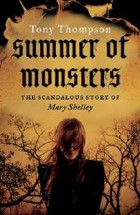Summer of Monsters: the scandalous story of Mary Shelley by Tony Thompson

Black Dog Books, 2014. ISBN 9781742032252.
Highly recommended for adolescent and adult readers.
'He that loves reading has everything within his reach.' William
Godwin.
This is a novel that deals with old issues, from a long past age,
with a great dose of modern story-telling, told in a free and
unfettered style, mimicking the spirit of its age. While enabling us
to comprehend the electric charge of their desire to change their
world, Thompson's characters fit the new genre of gothic literature.
His modernization of language resoundingly seems to echo the voices
and energy, and daring, that these young people showed in a world
where youth was short and life was often hard, and usually brief.
This story is about the emergence of Mary Shelley prior to her
writing of Frankenstein. I would highly recommend reading some of
the poetry of Percy Bysshe Shelley and some of Lord Byron's writing
would be helpful in understanding these characters. To begin to
understand the blossoming of change in the world of the text, I
would recommend reading some of Mary Wollstonecraft, Mary Shelley's
mother's writing as well as that of Mary's father, William Godwin,
an early anarchist, journalist, political philosopher, novelist, and
supporter of utilitarianism.
When we read of the approbation of women of this time, we might well
wonder at the sheer temerity of these women to not just refuse to
fit into their world but to flaunt their refusal publicly. We see
these characters as determined to rise above a definition of
womanhood that cramped and belittled women, in intellect, in
possibility, in lifestyle.
Thompson captures so adroitly this sense of the change in the air of
his characters' times, and yet firmly sets them against the
prejudices and preconceptions of the roles, particularly of women,
in that age. While the male characters are often deliberately
careless of the women's feelings, they do seem to be passionate
about their beliefs. Depicted as rebellious, and aching with love,
Mary is desperate to leave behind punishing rules and behavior.
Somehow Thompson's model of narration enables this old story to be
fresh, new and zinging with an electric charge.
I was captivated by this modernization of an old story and the zest
and pace of the narrative.
(Themes: women's rights; anarchism; romantic poetry (Shelley, Byron,
Coleridge); horror genre; monsters - the idea of the monster within,
or the human capacity to be bad, careless of the lives or feelings
of others, brazenly outrageously badly behaved; social class and
rules for/acceptance of different behaviour).
Liz Bondar